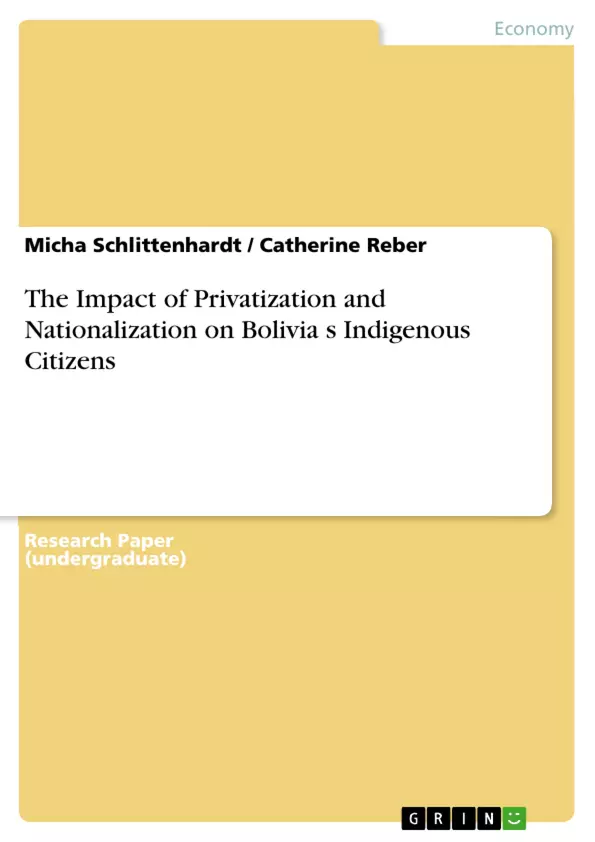This paper deals with the historical background of Bolivia due to economics and poverty. Furthermore, it points out the importance of the topic in regard to its historical development and illustrates today’s economic situation of Bolivia’s indigenous people. This paper will be part of the discussion about the country’s economic order and about which policy could be the best one for Bolivia by searching a concept in which Bolivia may improve the economic situation of its indigenous citizens.
Inhaltsverzeichnis (Table of Contents)
- Introduction
- The Economy of Bolivia
- Period of Privatization
- Period of Nationalization
- The Indigenous People of Bolivia
- The situation of indigenous people in the period of privatization
- The situation of indigenous people in the period of nationalization
- Discussion
- Conclusion
- Annex
- Sources
Zielsetzung und Themenschwerpunkte (Objectives and Key Themes)
This seminar paper investigates the economic situation of indigenous people in Bolivia. By examining this example, it highlights the significant influence of past economic orders, political structures, and particularly foreign relations on the country's development. The paper aims to contribute to the discussion about Bolivia's economic order and identify the most suitable policy for improving the economic situation of its indigenous citizens.
- The impact of privatization and nationalization on the economic situation of Bolivia's indigenous people
- The historical development of Bolivia's economic order and its influence on social inequality
- The role of foreign relations and international economic policies in shaping Bolivia's economic landscape
- The importance of considering different economic structures and policies in relation to the needs of the indigenous population
- The search for an economic solution that addresses the issue of poverty and promotes sustainable development in Bolivia
Zusammenfassung der Kapitel (Chapter Summaries)
The introduction provides an overview of the paper's focus on the economic situation of indigenous people in Bolivia. It emphasizes the importance of considering historical context, economic policies, and foreign relations in understanding the country's development.
The second chapter analyzes the economic history of Bolivia, focusing on the periods of privatization and nationalization. It examines the impact of these policies on the overall economy and explores the potential implications for indigenous communities.
The third chapter delves into the situation of indigenous people in Bolivia during the periods of privatization and nationalization. It examines the social and economic conditions of indigenous communities and assesses the impact of different economic policies on their well-being.
The discussion chapter critically analyzes the findings of the previous chapters and explores the implications of different economic structures and policies for Bolivia's indigenous population. It considers the strengths and weaknesses of privatization and nationalization in addressing the issue of poverty and inequality.
Schlüsselwörter (Keywords)
This paper focuses on the impact of privatization and nationalization on indigenous people in Bolivia. The keywords include economic policy, indigenous people, Bolivia, privatization, nationalization, poverty, inequality, governance structures, and sustainable development. The study investigates the historical development of Bolivia's economy, its influence on social conditions, and the search for an economic order that promotes the well-being of all citizens, especially the indigenous population.
Frequently Asked Questions
How has privatization affected indigenous people in Bolivia?
Privatization periods often led to increased social inequality and limited access to resources for indigenous communities, as economic policies prioritized foreign investment over local needs.
What was the impact of nationalization on Bolivia's economy?
Nationalization aimed to reclaim control over natural resources to fund social programs, which had varying impacts on the economic empowerment of indigenous citizens.
Why is the historical background of Bolivia important for its current economy?
Bolivia's history of colonialism and shifting economic orders has created deep-seated patterns of poverty and inequality that still influence policy decisions today.
What role do foreign relations play in Bolivia's development?
International economic policies and relations with foreign powers have significantly shaped Bolivia's governance structures and its ability to manage its own resources.
What is the search for a "best policy" for indigenous citizens?
The paper discusses finding an economic concept that balances sustainable development with social justice, specifically addressing the unique challenges faced by Bolivia's indigenous population.
- Quote paper
- Micha Schlittenhardt (Author), Catherine Reber (Author), 2012, The Impact of Privatization and Nationalization on Boliviaʻs Indigenous Citizens, Munich, GRIN Verlag, https://www.grin.com/document/202525



